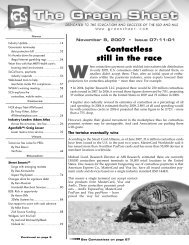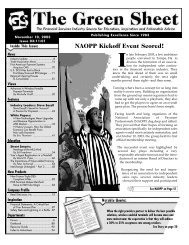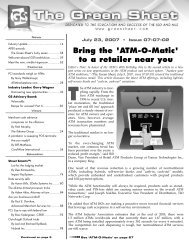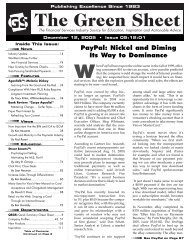View PDF of this issue - The Green Sheet
View PDF of this issue - The Green Sheet
View PDF of this issue - The Green Sheet
You also want an ePaper? Increase the reach of your titles
YUMPU automatically turns print PDFs into web optimized ePapers that Google loves.
By Tim Cranny<br />
Panoptic Security Inc.<br />
In <strong>this</strong> installment <strong>of</strong> our multipart series, we drill<br />
down on the seventh <strong>of</strong> the 12 requirements <strong>of</strong><br />
the Payment Card Industry (PCI) Data Security<br />
Standard (DSS). We will talk about what the <strong>issue</strong>s<br />
are, what merchants need to do, and what their ISOs,<br />
banks or processors can do to help them.<br />
Requirement 7 is "Restrict access to cardholder data by<br />
business need to know." It is the first part <strong>of</strong> the section<br />
"Implement strong access control measures."<br />
Requirement 7 is one <strong>of</strong> the more "high-level" parts<br />
<strong>of</strong> the PCI. Rather than a listing <strong>of</strong> narrow, specific technical<br />
requirements, it is more about having the right<br />
general rules in place to control access to cardholder<br />
data. While the more specific details are laid out in<br />
Requirements 8 and 9, Requirement 7 is the foundation<br />
for those details.<br />
What Requirement 7 is all about<br />
<strong>The</strong> essence <strong>of</strong> Requirement 7 is that the best security is<br />
preventative, not reactive. <strong>The</strong> best way to ensure that<br />
cardholder data is not compromised is to simply make<br />
sure as few people as possible have access to it.<br />
This basic idea is <strong>of</strong>ten called the "need to know" or "least<br />
privilege" principle. People should be able to access the<br />
tools and information they need to do their jobs but<br />
should have no access privileges beyond that.<br />
For example, bank managers need access to bank vaults<br />
and so should have it. But cashiers or janitors don't need<br />
that same access privilege and so should not have it.<br />
Another key point is that it does not say security should<br />
stop people from doing their jobs. <strong>The</strong> ideal is that the<br />
least privilege principle should be invisible to people<br />
doing the right thing; it should only become visible and<br />
active when they try to do something wrong.<br />
For instance, bank cashiers should have access to cash<br />
drawers and terminals, but security should kick in when<br />
they try to enter the bank vault, since they don't need that<br />
level <strong>of</strong> access.<br />
Think <strong>of</strong> security privilege controls like the safety barriers<br />
on the side <strong>of</strong> a mountain road – they're always there but<br />
only interfere with traffic when something goes wrong.<br />
66<br />
Education (continued)<br />
Digging into PCI – Par t 7:<br />
Restrict access to cardholder data by business<br />
need to know<br />
<strong>The</strong> challenges <strong>of</strong> Requirement 7<br />
Unlike some other parts <strong>of</strong> the PCI, Requirement 7 is<br />
simple to understand: <strong>The</strong>re is no mystery about the purpose<br />
<strong>of</strong> the requirement, nor is there a cloud <strong>of</strong> obscure<br />
technical <strong>issue</strong>s to confuse the merchant.<br />
Like Requirements 5 and 6 (discussed in "Digging into<br />
PCI - Parts 5 and 6: Maintain a vulnerability management<br />
program," <strong>The</strong> <strong>Green</strong> <strong>Sheet</strong>, Dec. 14, 2009, <strong>issue</strong> 09:12:01),<br />
the challenge is more about having the discipline to do<br />
unexciting but necessary things before disaster strikes, as<br />
opposed to the psychologically easier task <strong>of</strong> responding<br />
to a disaster that has already happened.<br />
Political will is <strong>of</strong>ten needed because merchants may need<br />
to improve (that is, change) business processes and how<br />
their employees operate. This <strong>of</strong>ten triggers active or passive<br />
resistance, turning supposedly simple compliance<br />
<strong>issue</strong>s into political and psychological ones.<br />
This is a rare case in which smaller organizations have an<br />
advantage over larger, more sophisticated companies. <strong>The</strong><br />
smaller the organization, the simpler these Requirement 7<br />
<strong>issue</strong>s usually are.<br />
For example, in the ultimate case <strong>of</strong> a one-person operation,<br />
there are no internal politics to worry about, and all<br />
these "who does what" questions simply get answered<br />
with, "I pass all these questions because there's just me,<br />
and I'm supposed to do everything."<br />
In larger organizations, the political and organizational<br />
costs are likely to be much greater, simply because the<br />
<strong>issue</strong>s are more complicated, and procrastination is a bigger<br />
danger.<br />
One thing merchants (and their advisors) need to remember<br />
is that when <strong>this</strong> requirement discusses "access privileges,"<br />
it's not just talking about accessing computer files.<br />
Any unauthorized access to cardholder data is a problem,<br />
so merchants need to take a proactive approach. Find any<br />
problems that exist and fix them, rather than take a minimalist<br />
"they didn't specifically say I had to worry about<br />
that" approach.<br />
For example, physical access to paper records or POS<br />
devices is an <strong>issue</strong>, and I will cover it in more detail when<br />
I consider Requirement 9.<br />
What merchants need to do<br />
As with Requirements 5 and 6, merchants need to focus
















